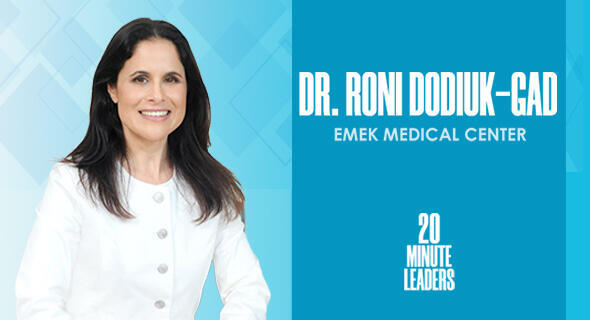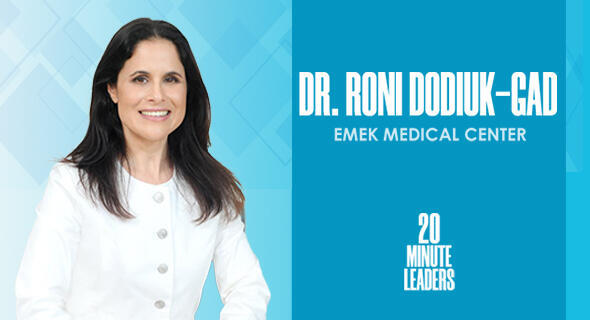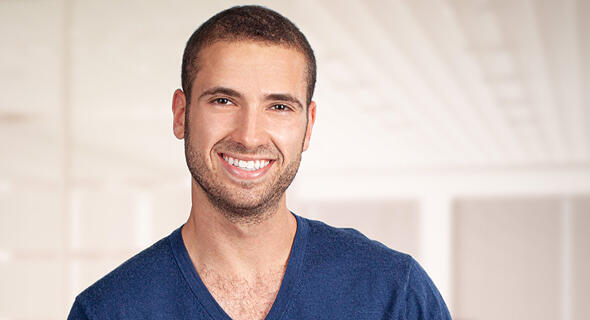
20-Minute Leaders
“You need to invest in your career in the beginning, even if for the short term it doesn't make any sense.”
Balancing family, career, and self is important, says Dr. Roni Dodiuk-Gad.
Balancing family, career, and self is important, says Dr. Roni Dodiuk-Gad. While you may be more focused on one of them for a short season, she explains you need to keep all three in mind. She shares that what is really meaningful are your relationships, so you need to invest in them throughout your life. But Dodiuk-Gad also advises investing heavily in your career early on, which will pay long-term dividends. Paying to outsource many tasks is what helped her to put the necessary hours into her medical career and spend meaningful time with her family while at home. She shares that many people will not be supportive of mothers investing so much time into their careers, and she had to learn to not expect many encouraging voices. Dodiuk-Gad says that she also learned to be comfortable with good enough instead of perfection.
Tell me about your work.
First of all, I'm a physician. I'm a dermatologist doing only hospital-based patients. Then I'm a scientist. I love doing research. I get the time to think and to really take what I've seen in my practical work, and then go into more of the molecular basis and think about how we can do it in a better way.
I'm also an educator. I've established two global educational platforms in dermatology. I also see myself as a global collaborator. Today we live in a world where what connects me with other people is our passion. It's not where I'm located geographically.
Looking back at your career, what are some of the insights that would have been relevant for you, but are definitely relevant to young females and even people in general?
I've learned so much in 26 years of professional life. I wish somebody had told me the things that I know now. It's not only women, but women do have specific issues.
There's what I call the "challenging triangle of life." You have three vertices: your family, your career, and yourself. How do you coordinate yourself between these three corners? In the time that you become a professional person, you are also building your family, which is also very important. I was struggling with this triangle, trying to do everything and making many mistakes.
There are some obstacles that I realized. One of them is what I call the "misleading financial calculation." When I was a resident, all the money that I earned went to give to the babysitters and the home tasks. Other people were taking care of my children many hours a day when I was at the hospital. So many people came to me and said, "It doesn't make any sense. You don't earn money because all the money that you actually earn, you pay some other people. Then you don't earn money and you don't see your kids as much as you want." If you look in the short term, it doesn't make any sense to earn money to give it to somebody else and then you also don't see your kids.
But then if you think about it in the long-term, you build yourself a career, you build yourself, first, financially. You need to invest in your career in the beginning. I'm not even talking about self-inspiration, self-fulfillment, and all the other important stuff. But even for only the financial.
There's a lot of very foundational understanding here that the compound interest that one gets when they put in a dollar into their 401(k) essentially multiplies itself tenfold within a 30-year span. Here, it's a little bit harder to prove mathematically. But if you put away the personal feelings and the assumptions of society, you actually understand that it's very much the case.
People convince us, especially because it's a very sensitive issue, which relates to our children. You need to be very strong about it.
In Sheryl Sandberg's Lean In, she talks about the challenging marathon. Think about a woman and a man running in the marathon of their career. The man, when he runs, everybody cheers him on. "You're so great. You're building the future of your family. You're going to be earning a lot of money.”
What is the voice of the audience to the woman running? I know the audience very well. The audience is like, "Oh, you're running? But where are your kids? Somebody else is taking care of them. Do you really know what was in school today?" They would never cheer you on. I can count on one hand the people who said to me, "Wow, good for you. You're doing the right thing." I think when you do not expect the audience to be a supportive audience and you just say, "I know this is the voice that I'm going to hear, but that's okay." This is one thing that I learned: not to expect. I'm not disappointed.
You're saying, "Maybe as a good start, let's understand the expectations. Accept them, disagree with them, and own that disagreement."
Yeah. Don't try to convince anybody. It's not going to happen. It's their issue, it's not yours.
I think there are two other things that I realized more for me as a female. One is our instinct to please. We feel uncomfortable saying no. You want to say yes; you want to help everybody. When you have a career and your time is so limited, you need to say no. It's still hard for me to say, "No, I'm sorry. I'm not able to do that.”
Then I think a tip for a great career is to remember: good enough is enough. I'm a perfectionist. I learned through time that it's a bad thing. You need to be comfortable with good enough. If you have drawbacks, that's okay. You're still running. It's a marathon; it's not a sprint.
If you said to me, "What is the one tip that you want to say to young people?" Outsource. My grandmother said to me, "Roni, the towels don't care who folds them, but your kids will deeply care who tells them the story before they go to sleep." I'm still outsourcing everything. Whatever I don't need to do, I am not doing. The time that I have at home, I make sure is impactful and really meaningful time with my beloved ones.
I've seen many people who have careers, but then at the end, they have no friends or the family already gave up on them. You need to invest in relationships. In life, what is important and makes us happy is really relationships. You just outsource other things. Even if you need to pay money for that.
It is a balance, because you could be at the hospital 24/7, but you choose to come home and tell the stories to the kids at night. That is the biggest ROI. That great balance is something that we just don't talk about.
It's exactly going back to the triangle. Sometimes in life, it doesn't have to be all the time balanced. Maybe one year I was mostly my career, but then another year I was being more at home. It doesn't have to be at the same moment in this harmony. But I think it has to be in your mind, and you have to remember those three important vertices in your life.
I want to give credit to my mother. She's a professor; she has a wonderful career. I can't even imagine how it is if you come from a home that is not supportive. I had a supportive family and husband. And it's still a struggle. I think it's okay to say that it's hard.
I had to go to New York to work there for a month, and my son was very upset with that. When we came back to Israel, we went to a vacation in Eilat. I stayed at the beach with my son, and he cried for half an hour: "I hate you. I don't want to see you. I don't want to be with you. Where is my father?" I wanted to disappear at that moment. But now, everything is okay. My son is so close to me, and we're great. There will be these moments. We need to talk about it.
That moment could have brought me to say, "I'm giving up on everything." I just needed to understand. I remember saying, "This is the price. Everything will be okay because I really believe in what I do." I believe in the reason I'm in medicine and doing research and science. A few days ago, my son said, "You inspire me."
Michael Matias, Forbes 30 Under 30, is the author of Age is Only an Int: Lessons I Learned as a Young Entrepreneur. He studies Artificial Intelligence at Stanford University, is a Venture Partner at J-Ventures and was an engineer at Hippo Insurance. Matias previously served as an officer in the 8200 unit. 20MinuteLeaders is a tech entrepreneurship interview series featuring one-on-one interviews with fascinating founders, innovators and thought leaders sharing their journeys and experiences.
Contributing editors: Michael Matias, Megan Ryan














